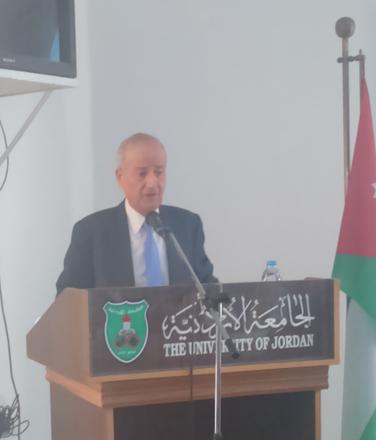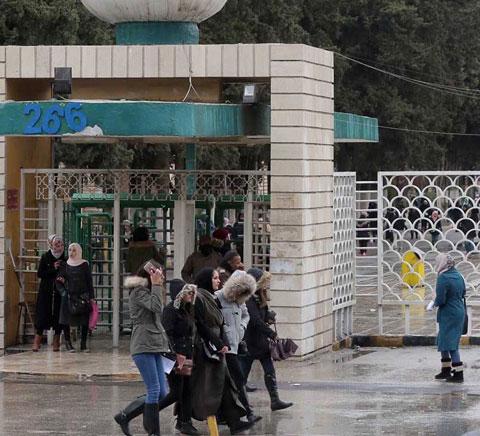You are here
‘University proficiency exam reveals student weaknesses in scientific research, analytical skills’
By Laila Azzeh - Aug 18,2015 - Last updated at Aug 18,2015

Higher Education Accreditation Commission President Bashir Zu’bi speaks at a workshop in Amman on Tuesday (Photo courtesy of HEAC)
AMMAN — The vast majority of university students suffer from “poor” scientific research, analytical, critical and numerical skills, according to observations based on the results of the proficiency exam.
The capacity-measuring test, which was introduced by the Higher Education Accreditation Commission (HEAC) a few years ago, revealed that universities lack compulsory courses that cover cognitive skills, according to the commission.
On the bright side, the results of the 2014-15 academic year have shown “noticeable” improvement in students’ performances compared to previous years, perhaps due to the “higher turnover of students who took the exam in the recent academic year”.
Under the HEAC’s new regulations, all students expected to graduate from private and public universities are required as of November 2014 to sit for a proficiency exam that tests their abilities in relation to their respective academic majors and other necessary skills.
Previously, a random sample of 40 per cent of graduating students sat for the exam at the end of every academic semester, but the new regulation makes it compulsory for all students to sit for the exam by the end of their graduation semester.
While the move is meant to mainly evaluate universities’ academic programmes, the way the test is handled, its purposes, timing and ability to genuinely gauge students’ abilities remain a controversy among academics.
The feasibility and reliability of the proficiency exam were the highlight of a workshop held Tuesday to gauge universities’ opinions on this assessment tool.
The fact that the exam is held at a time when students are working for their graduation makes it more of a burden, with many not taking it seriously, university presidents said at the workshop.
The exam tests students’ abilities and knowledge at
the macro-, mid- and micro-levels.
Under the macro-level, the focus is on scientific research, analysis and critical thinking skills, in addition to problem solving, communication, general knowledge, ethics, language and mathematical proficiencies.
The mid-level tests students’ abilities in their respective specialisations, while the micro-level includes all the proficiency skills that students are expected to master after graduating in their fields.
“We are aware that sitting for three different exams is very exhausting for students. That is why we are planning to make students sit for only one session instead,” HEAC President Bashir Zu’bi said at the workshop.
Participants at the workshop said the exam requires holistic development in the way students perceive it and the type of questions it includes, noting that universities should also be engaged in designing the exam.
On the other hand, discussions also covered the possibility of coordinating with the Civil Service Bureau to spare students who passed the proficiency exam from sitting for the bureau’s assessment exam and make them eligible for more job opportunities and higher education programmes.
Some speakers argued that this would burden the exam and its main purpose in evaluating the academic capacity of students and the strength and weakness of universities, calling for using it as a self-assessment tool; while others said university rankings should be based on students’ performance in the exam.
Related Articles
All students expected to graduate from private and public universities will be required to sit for a proficiency exam starting in November, a higher education official said Sunday.
AMMAN — Education experts say further incorporation of critical thinking skills in university programmes is needed to enhance the performanc
AMMAN — Higher Education Accreditation Commission (HEAC) President Bashir Zu’bi on Thursday said that results of classification of the Jorda

















